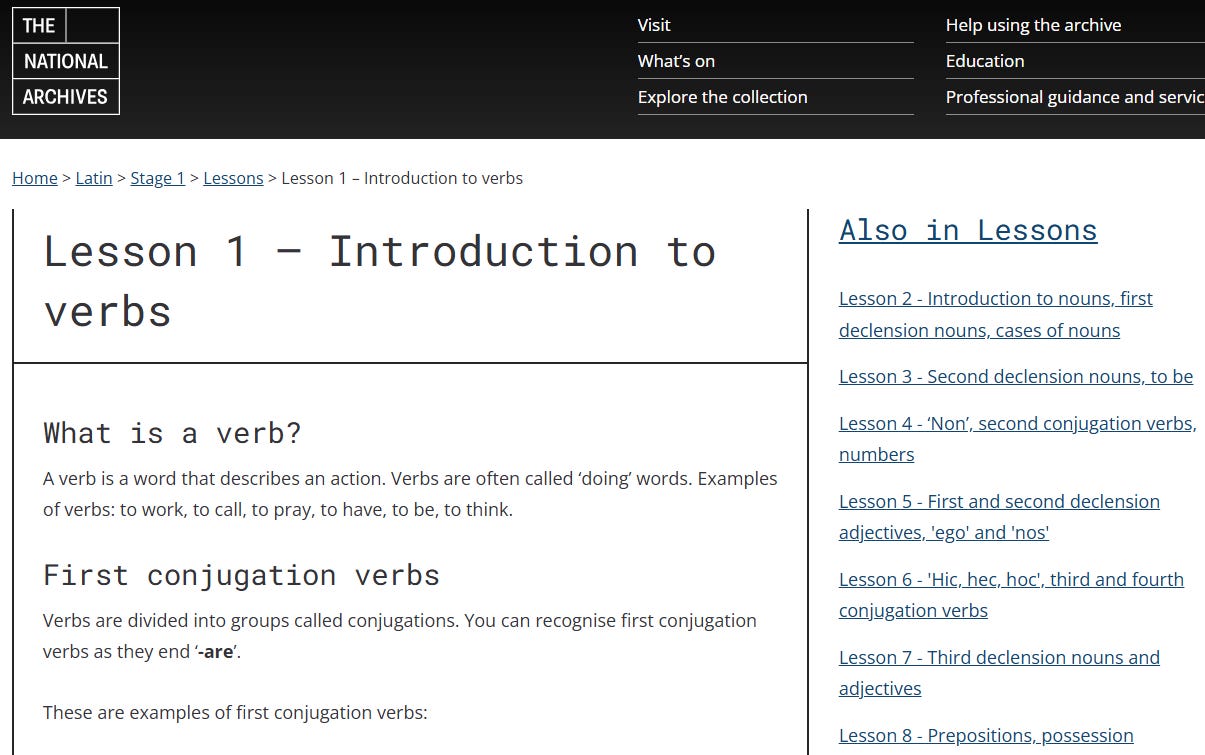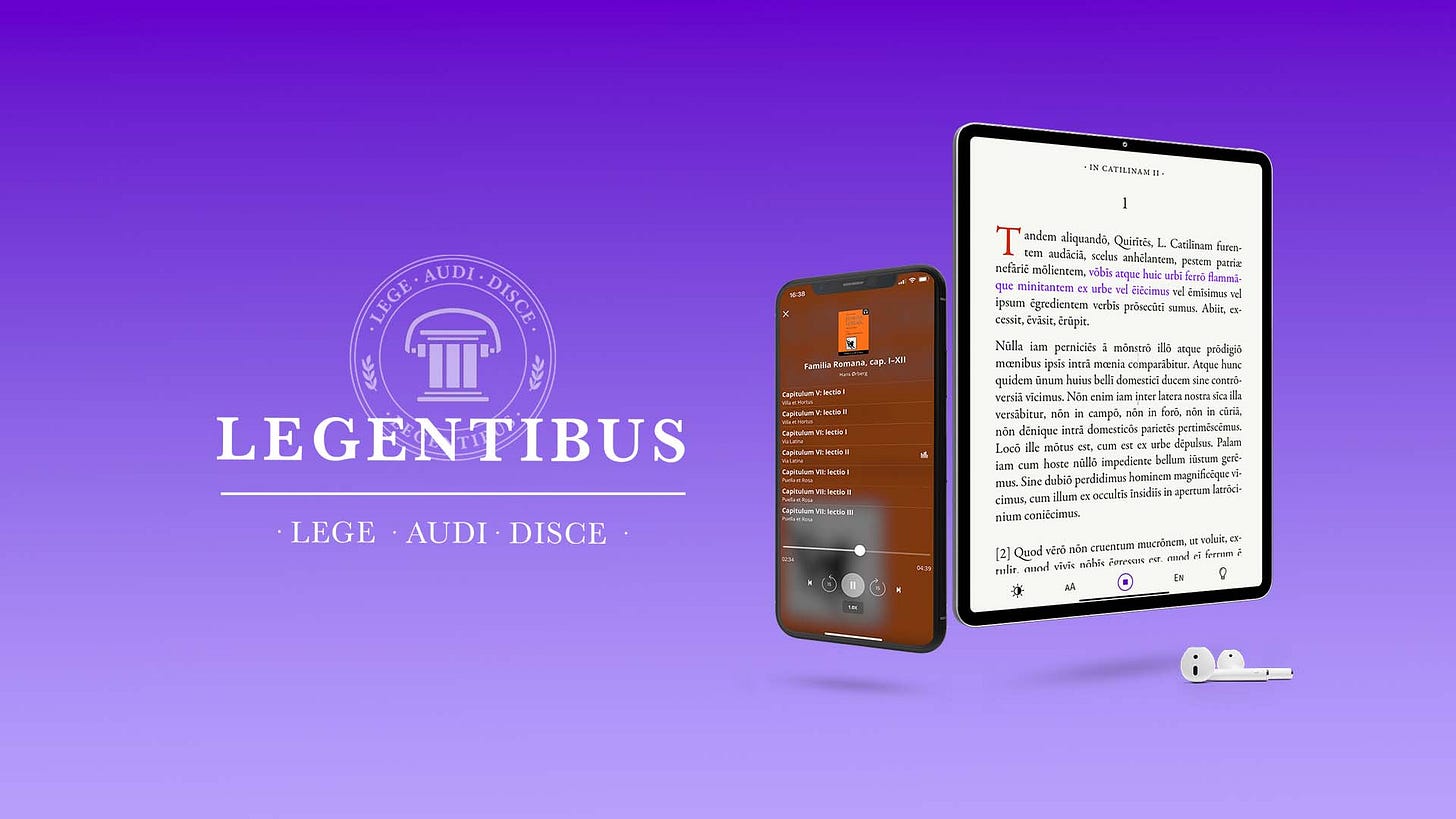Learning Latin for study?
A concise list of tried, tested, free and accessible tools for learning Latin for reading and research
Historically, Latin has not been the most accessible language. I was one of a very small minority of state school kids who had the opportunity to learn Latin at GCSE level and then Classics at A-level, but since then, I’ve not kept up with my learning, to my own detriment. Besides auditing a small medieval Latin course during my MA, my knowledge has plummeted as I’ve totally neglected it since I went to high school. Unfortunately, learning Latin is critical if you mean to study the medieval period beyond BA level; I got very lucky that I didn’t need it for my MA studies as I focused on an archaeological lens instead.
However, since I was granted my PhD funding I’ve realised very quickly I need to get ahead of the Latin learning curve so I can read my sources in their original language; translations are fine for the gist of the text, but nowhere near as important as studying sources in their original language first-hand, especially when you want to do linguistic analysis. Unfortunately, this now means I need to relearn a tonne of verb endings, without access to the structured learning of a classroom environment until my course starts, so I was bricking it.
Thankfully, accessible Latin learning has been improving drastically in the 21st century, which has been aiding my journey to remaster the language to no end, and allowing those who may never have been able to access Latin at school before to learn it for the first time. To get back up to speed, I’ve been scouring the web for free learning resources and thought I’d make a list of the ones that have been helping me most, along with the contexts in which I used them.
I’ve kept this list very selective by only listing the resources that I personally used and found helpful because there are so many courses and textbooks out there (which I found pretty overwhelming when I was attempting to find good starting points).
This list is not perfect by any means, and no doubt I’ll come back to this post and update it regularly when I start my programme officially in September. For the time being, I hope this list is useful if, like me, you were struggling with where to know to begin when it comes to starting to learn Latin.
National Archives “Learn Medieval Latin” course
Best for learning Latin as used in archival documents
Try Latin translations of National Archive documents from a very early stage
Not as interactive as CLC or Legentibus

The National Archives course is fantastic - unlike some other courses, it outlines the grammar from the get go. Some of the activities do feel repetitive at times (I am not a big fan of writing out how to decline 3rd declension nouns 7 different times, for example) but honestly, this course has been one of the most efficient and clearest ways I’ve seen freely available online. It explains everything with fantastic clarity - if you’re learning Latin to translate archival documents (like me), this course is excellent at exploring the nuances that come with translating these documents and the quirks that come with them. Just note that their activities are no longer interactive, but can be completed homework-style by downloading the PDF.
Legentibus App
Most accessible language learning app I have seen
Regularly updated with new material and books - all of which are fully interactive and available as an audio book
NOTE: The first modules are free, but then you need a subscription to continue down the structured course

Legentibus is what I first used when I started relearning Latin, and it immediately gave me far more confidence than I anticipated. It has digitised and made fully interactive well known Latin textbooks such as Familia Romana, as well as original content by the app’s creators. Whilst it is only free up to a certain point (module 3, I believe), it is one of the most well structured language learning apps I have seen (looking at you, Duolingo) and, whilst I haven’t signed up for a subscription just yet, I’m nearly 100% certain I’ll be investing in it. If you’re willing to part with some money for a Latin learning tool, I highly recommend this one.
Cambridge Latin Course Online
Online versions of the activities as featured in the CLC textbooks
All textbooks’ vocab, tests and exercises available
Best used with the CLC textbooks, which aren’t available for free
The CLC is probably one of the most familiar Latin programmes, especially for UK students if you have studied Latin at school previously; it was the course that I covered myself between 2014-2017. These online activities are designed to supplement the course textbooks so they may feel a little strange if you haven’t interacted with the textbooks before, but they feature all of the grammar and vocabulary, as well as many of the Latin passages from each chapter in an interactive translation format. Whilst this did make me feel like I was back in year 10 again, the materials are pretty solid, and it was lovely to say salve to Caecilius, the main character of Book 1, again.
The Open University “Getting Started on Classical Latin”
Excellent introductory course for those who have never interacted with Latin before
Introduces Latin’s impact on the English Language and pronunciation
Serves as an introduction to the language, you will need to find an additional course to take you beyond the basic introduction
The Open University’s Open Learn course programme is a brilliant and accessible way of exploring many free courses, all of which give you a free certificate of participation (I highly recommend their Digital Humanities course!). Their Classical Latin course is a great starting point for those who have never interacted with the language before - I’d recommend starting here to gain some basic historical and linguistic context before progressing to apps like Legentibus or programmes like the Cambridge Latin Course. Whilst it doesn’t go into a heavy amount of depth, it introduces basic grammar rules, pronunciation and takes you through some introductory translation.
Do you know of any more accessible Latin learning tools I haven’t featured here? Drop a comment below and I’ll check it out before adding it to the list! Please provide a link and short description.







I just bought wheellock's book, workbook today. I do better with written material than AV material, but I’m definitely going to use some of these website especially the national archives. Thanks, Olivia.
I debated whether I should learn Anglo-Saxon or Latin. Decided there was more available in historical documents in Latin. My next step will be learning to decipher the calligraphy.
This has inspired me to get back into learning Latin! I did two units at university and loved it, but gosh it's quick to forget. I didn't realise there's so many accessible options out there now, so I'm going to check them out - thank you!